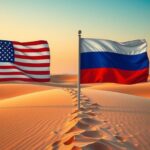Conflicts
Politics
DEFENCE, DONALD TRUMP, EUROPE, EUROPE/ASIA, FEDERAL SECURITY SERVICE, FOX NEWS, FSB, GEOPOLITICS, NORTH AMERICA, PUTIN, RUSSIA, RUSSIA-UKRAINE WAR, RUSSIAN INVASION OF UKRAINE, RUSTEM UMEROV, SERGEI BESEDA, STEVE WITKOFF, UKRAINE, UNITED STATES, US, US PRESIDENTIAL RACE, WAR
Clara Montgomery
US-Russia Negotiations in Saudi Arabia: Key Discussion Points on Ukraine
Negotiations between the US and Russia in Saudi Arabia aim to establish a ceasefire in Ukraine, focusing on the Black Sea grain deal, energy infrastructure, and humanitarian concerns such as the return of Ukrainian children. Discussions follow US-Ukraine negotiations and reveal cautious optimism amidst diplomatic challenges.
Negotiators from the United States and Russia have begun talks in Saudi Arabia, focusing on achieving a ceasefire in Ukraine. Key topics include the resumption of the Black Sea grain deal and a halt to attacks on energy and civilian infrastructure. These discussions took place a day after separate negotiations between the US and Ukrainian delegations which aimed to bring a conclusion to the ongoing conflict lasting over three years.
The Russian delegation comprises Sergei Beseda, a veteran of the Federal Security Service (FSB), alongside diplomat Grigory Karasin, former deputy foreign minister. From the US side, Middle East envoy Steve Witkoff expressed optimism for progress in establishing a ceasefire. “I think you’re going to see in Saudi Arabia on Monday some real progress, particularly as it affects a Black Sea ceasefire,” he stated.
Despite some optimism, the Kremlin has tempered expectations. Dmitry Peskov, the spokesman for the Kremlin, remarked, “We are only at the beginning of this path. There are difficult negotiations ahead.” This latest round of discussions reflects heightened diplomatic efforts by the Trump administration to mediate a peace agreement.
During the preceding US-Ukraine talks, Minister Rustem Umerov described discussions as “productive,” focusing on critical and energy infrastructure protection. Ukrainian President Volodymyr Zelenskyy emphasized the necessity for an order from Russian President Vladimir Putin to cease attacks, stating that true resolution requires accountability from both sides.
The discussions for the US-Russia talks commenced on Monday morning. Major points on the agenda include a Black Sea maritime ceasefire, as highlighted by US National Security Advisor Mike Waltz, who stated the intention to facilitate grain and fuel movement within the Black Sea. Russia’s Kremlin spokesperson indicated that the resumption of the Black Sea grain deal would be a central topic of the negotiations.
Additionally, energy infrastructure and a potential month-long ceasefire are vital aspects of the agenda. The dialogue aims to address how such a ceasefire can be monitored and enforced. Waltz noted that the discussions would cover technical details, including lines of control and verification mechanisms for a ceasefire: “We’ll talk the line of control… freezing the lines where they are.”
Another important issue is the return of Ukrainian children. The US-Ukraine ceasefire statement emphasized the need for prisoner exchanges and the return of forcibly relocated Ukrainian children, which may be among the confidence-building measures discussed in the negotiations.
Responses from Ukraine’s European allies have been mixed, especially after Trump initiated talks with Vladimir Putin unilaterally, sidelining European leaders. Amidst tensions and the desire for enhanced security guarantees, European authorities have been compelled to bolster defense budgets in light of Russia’s military actions. Therefore, the role of European allies in the negotiation process remains ambiguous.
Prime Minister Keir Starmer of the United Kingdom stated that a coalition would draft peace terms for the US. However, Witkoff characterized European concerns regarding potential Russian territorial ambitions as exaggerated, asserting, “I just don’t see that he [Putin] wants to take all of Europe. This is a much different situation than it was in World War II.” Thus, while the talks present an opportunity for progress, the outcomes remain uncertain.
The US-Russia talks in Saudi Arabia represent a critical step toward achieving peace in Ukraine through a proposed ceasefire and discussions on key humanitarian concerns. Both parties will address significant issues, including the Black Sea grain deal, energy infrastructure, and the return of Ukrainian children. However, while there exists optimism for progress, challenges remain, particularly in monitoring agreements and integrating the voices of European allies into the negotiations.
Original Source: www.aljazeera.com








Post Comment